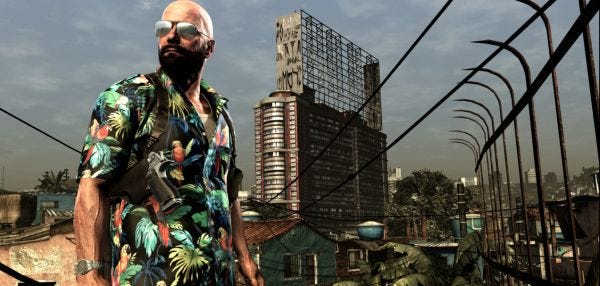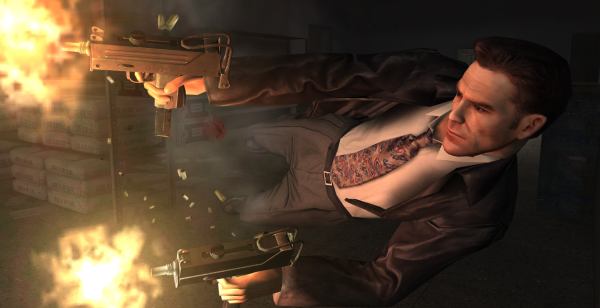Stop Making Scenes: Against Cinema In Games
Between Accident And Animation
'Cinematic' should rightfully be a dirty word when discussing games and yet Max Payne 3's marketing wears it proudly, like a sweat-stained vest or an inappropriately jaunty tie. A cutscene is cinematic, every detail and angle just so, no room for accident or deviation, but to aspire to a ‘cinematic’ experience during play is to ignore so much of what makes experiences within a game unique to the form. We run, gun and react in worlds that rely, for the enjoyment they bring, on the accidental and the curious as much as they require adherence to a plan. Here’s to the unexpected, the unplanned and the unforgettable.
By ‘accidents’ I mean the things that nobody scripted, the moments when elements and actors play against one another in a fashion that hasn’t happened a thousand times before and may never happen again. Even if a film utilises such strange confluences – a gull dropping into the ocean in the final shot of Barton Fink, the hundreds of necessarily retained slips in the single take of Russian Ark – once they are committed to the final edit, they are no longer accidents. From then and forever, that’s simply the way that things went down.
Animated films are different in that, frame by frame, the visual content is the product of deliberate creation. No accidents there, or at least not of the same sort. There's no chance of an unexpectedly distracting face in the crowd to draw attention away from Princess Disney's exchange of vows, not unless that face was deliberately placed there. Use of CGI or painted backdrops muddies the waters, providing more control and less opportunity for accidents, happy or otherwise. Here's an example we can all appreciate: Three Men and a Baby's ghost would be an Easter egg if the film were an animation. In the version that exists, it's a terrifying accident.
The cinema is cinematic but games are not, or at least they shouldn’t be, not in their entirety. An action film can contain thousands of moving parts in a scene, a drama could contain a sequence communicated through the lack of motion, but in most instances the effectiveness of both will be achieved through blocking, through choreography and rehearsal, through placement and post-production. A game allows these elements to be broken and rearranged, and for each sequence to become something new.
The first time I shot a combine soldier in the face and he slumped forward and slid down some steps I stopped and watched. I died shortly afterwards and had to shoot him again. He slumped forward and slid down those steps again but this time he had more forward momentum. He slid further. Hardly any difference at all but I still remember it perfectly.
There's a mook at the top of some stairs - stairs are often involved - in Max Payne 2, right after Max has grabbed a shotgun and secured it in his inventory, where the sun don't shine. Pop out the boomstick, blast the goon and he's propelled against the wall, slamming into a shelf stacked with cans. The shelf collapses, the cans fall to the ground, roll, perhaps trundle down the steps one by one. Do it a hundred times and it'll be subtly different each time and rarely perfect. In an ideal world he would never end up with the ruins of the shelf jutting through his body in an impossible fashion and the cans would always fall just so.
It's not a perfect world though because everything is dependent on location and time. When exactly is the shot fired, where is the point of impact, how exactly will this one death, among thousands, stand out on this particular occasion? It's not a cutscene, it's something that I did, over and over, and felt a strange attachment to, even if it might never have turned out quite as 'cinematically' as it could have done.
Extrapolate from this and think of Total War. When the clever folks at Weta were tasked with creating the Helm's Deep battle for The Two Towers they apparently used an AI programme for the combatants in the wide shots, to save animating each participant individually. On the first runthrough, some of those AI characters ran away and that's not how it's supposed to be, so the whole thing was rejigged. Accidents were eliminated and a final form was agreed on. That doesn't happen in a wargame because they aren't cinematic anymore than an action game is, even if they do have sweeping cameras taking in a field of thousands, flanking, fighting and, yes, occasionally running away.
Let's go further still and consider the events that Jim has been so excited about in Day Z. The tension, horror and shock here aren't tied to anything that should be deemed 'cinematic', they are instead the product of human interaction within complex systems at work. As with experiences as diverse as STALKER and Dwarf Fortress, the systems allow for individual experiences, accidental narratives and mistakes in both the working of the world and the actions of the entities within it.
Away from the confines of celluloid there is another world of creativity, a place where perfect repetition is an impossibility. A stage performance, be it musical, theatrical or comedic, can contain slippage, improvisation, interaction and variation. No matter how much precision a stage direction contains, nor how obsessively actors and technicians are implored to adhere to those directions, every performance is unique.
Beckett, my very own favourite absurdist, fought against that variation at times, seeing the actors as further machinery of the stage, automatons following a route and a script, almost like the mechanical contraptions that go through their motions as a ghost train passes by. In some ways, that theatre of the absurd has been presented to us in games throughout the years, in shooting galleries with little room for maneuver and, often enough, wherever there are rails, as in Beckett's stagebound houses of horror.
It's not difficult to make the connection between a stage full of players and a more open world full of the same. When a gunshot echoes through the Zone, improvisation begins, roles are assumed and develop as each brief plotline emerges, takes shape and sometimes ends almost as quickly as it began. We don't need the awesome scope of possibilities contained within a STALKER to escape from the predetermined and pre-canned, not when even our shooting galleries are capable of dramatic and varied performance.
With Max Payne 3 either incoming or incomed, depending on where you live and whether you're consoleboxing it or not, there is once more a deluge of marketing material, reviews and other assorted wordbits attempting to convince the world that it's a stupendously 'cinematic' experience. I would have thought one of the reasons such an elaborate and impressive animation system has been put in place is to allow for the emergence of drama, to make each gunfight, each kill and each diving scramble for cover a fraught experience, unique to the player, not an exercise in observation.
This is technology that visually impresses while allowing for those accidents and memorable deviations from the script that are impossible in cinema. The difference between seeing a gangster blown off his feet and crumpling against a wall and thinking, "that looked neat" and thinking "that just happened".
Gaming can be where things happen rather than where things are directed, and it doesn't matter whether it's the drunken collapse of a ragdoll or the annexation of the Kingdom of Sicily by the Holy Roman Empire, it's not cinematic, it's the product of play and of simulation rather than (or along with) direction and control. Max Payne 3 may have action in abundance but unlike an action film it could also contain an infinitely generating collection of deleted scenes and a hell of an expansive blooper reel. And you'll be making them. Making them by shooting angry men in the face, body and legs.
Whether it's how they animate or how they act, how they deal with change or how they die, the entities in games are so often incomplete, so often continuing to be capable of surprise even after we think we know them so well. I revisit films again and again because I like to share them with other people and because there's a comfort and a joy in studying and sometimes analysing every element. On the whole, my reasons for revisiting a game are entirely different. Leave cinematic to the cinema and let's celebrate our differences, one of which is the astonishing capacity to generate differences.
If 'cinematic' is entirely the wrong word to use though, then perhaps we need to find a new word to put in its place. 'Dramatic' doesn't quite cut it and although I'd love to see it blazoned across game boxes, I wouldn't have thought that 'theatrical' has any chance of taking root. "Coming from the makers of Grand Theft Auto, a theatrical experience like no other." Or perhaps, "Max returns in an action-packed extravaganza of happenstance and thrilling fortuity". My ideas are crap but maybe you can take the skeleton of one of those sentences and do better.
The word 'cinematic' has accrued false meaning and from being something to aspire to, as technology has progressed it has become increasingly semantically irrelevant. When a noir-fuelled game of men shooting men can so strikingly provide the happy accidents and visual improvisation which clearly distinguish it from the old master that is recorded action, the aspirations of the past start to seem more backward-looking than ever.












